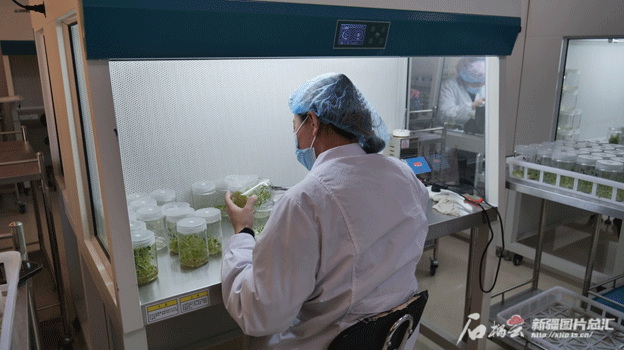In recent years, Qinghe County in Xinjiang has made significant strides in the potato industry by establishing a robust three-tier seed potato propagation system, consisting of “nuclear seed” (原原种), “basic seed” (原种), and “certified seed” (一级种). This advanced system has pushed the local potato industry into a modern, technologically-driven era, fostering economic growth and raising the income levels of farmers.
Geographic Advantages and Modernization Efforts
Located in northern Xinjiang, Qinghe County enjoys a cool climate and significant temperature variation between day and night—ideal conditions for potato cultivation. These natural advantages have allowed the region to specialize in potato farming. The county has capitalized on these benefits by building a solid foundation for the potato industry through technology, farmer support, and market expansion.
The three-tier seed propagation system plays a crucial role in ensuring both the quality and quantity of potato production. “Nuclear seeds,” the first step in the system, are produced using cutting-edge techniques such as shoot tip meristem culture, which helps eliminate viruses and ensures high-quality, disease-free potatoes. Although these “nuclear seeds” are tiny—averaging only 2 cm in diameter—they hold tremendous economic value, being several times more expensive than regular potatoes due to their critical role in ensuring the next generations’ vitality.
At the heart of the system is the Xinjiang Kunyuantai Seed Technology Company, a leading enterprise in Qinghe’s potato industry. Established in 2016, this company has built an extensive infrastructure to support the production of virus-free seed potatoes. It manages over 1,500 square meters of tissue culture labs, producing over 4 million virus-free seedlings annually. Additionally, the company has 44 greenhouse facilities for cultivating micro-tubers (nuclear seeds), capable of producing between 7.5 and 8 million units per season, enough to support planting across 1,500 acres.
From “Nuclear Seeds” to Commercial Potatoes
The journey from “nuclear seed” to market-ready potatoes is a multi-step process. After the production of nuclear seeds, they are planted to produce “basic seeds.” These basic seeds, when planted, yield “certified seeds” in the following season. Finally, the certified seeds are sold to farmers, who use them to grow commercial-grade potatoes. This process ensures the highest quality standards at every stage, providing healthy, productive plants for large-scale cultivation.
In 2023, approximately 2,000 acres in Qinghe County were dedicated to growing basic seeds, resulting in around 6,000 tons of output. These seeds are expected to meet the needs of about 25,000 acres for certified seed production in the following year. Such high-quality seeds are essential for enhancing yields and improving the overall economic performance of the potato industry.
Scaling Up the Potato Industry
Qinghe’s comprehensive seed propagation system has enabled the county to plant about 30,000 acres of potatoes annually, driving employment and boosting local incomes. It is estimated that the industry creates over 20,000 seasonal jobs each year, generating income of around 15 million yuan (about $2.3 million USD).
In addition to seed production, Qinghe County has developed its potato storage infrastructure, which includes climate-controlled facilities with a capacity of 10,000 tons. This allows farmers and companies to store their crops safely for extended periods, maintaining product quality and reducing post-harvest losses.
Moreover, the expansion of the potato industry has stimulated the development of associated sectors, including processing, marketing, and distribution. These activities contribute to a well-rounded industrial ecosystem, allowing the region to move toward large-scale, standardized production.
Branding and Market Expansion
Recognizing the importance of branding, Qinghe County has actively worked to promote its potatoes through various marketing channels. The county organizes events such as the Potato Culture Festival and participates in agricultural expos to raise awareness of the quality of Qinghe potatoes. Additionally, efforts have been made to expand sales to markets in neighboring regions and throughout China, creating new opportunities for growth and collaboration.
The establishment of a mature, three-tier seed potato propagation system in Qinghe County is a testament to the region’s commitment to modernizing its potato industry. With a clear focus on quality, productivity, and market expansion, the county has created a sustainable and profitable potato supply chain. This system not only benefits local farmers by increasing their incomes but also strengthens the region’s position in the domestic potato market. As Qinghe continues to innovate, its potato industry will likely serve as a model for other regions looking to modernize agricultural practices.







